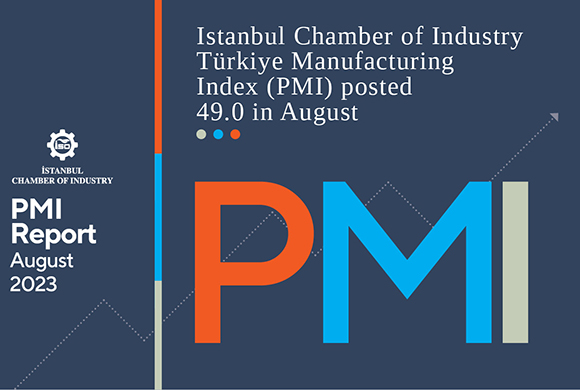News
August 2023 Report of ICI Türkiye Manufacturing PMI and Türkiye Sector PMI Released
- 01.09.2023
- News

The Istanbul Chamber of Industry Türkiye Manufacturing PMI posted 49.0 in August, from 49.9 in July, below the 50.0 no-change mark for the second month running and thereby signalling a further slowdown in the Turkish manufacturing sector. The rate of moderation implied by the index was only slight. Firms reportedly struggled to secure new orders over the course of the month, seeing new business moderate again, and to a greater extent than in the previous survey period. A key factor deterring customers from committing to new orders was strong price pressures.
According to the August report of Istanbul Chamber of Industry Türkiye Sector PMI, four out of 10 monitored sectors increased their output. The strongest increase was in electrical and electronic products, while the sharpest slowdown was in clothing and leather products sector. Most of the sectors lost their momentum in new orders and the input costs continued to increase in general with the most significant increase in land and sea vehicles sector. Non-metallic mineral products sector saw the fastest increase in sales prices. Four out of ten sectors increased their staff level.
Istanbul Chamber of Industry (ICI) released the results of its August 2023 Türkiye Manufacturing PMI (Purchasing Managers’ Index) survey, the fastest and reliable reference accepted in manufacturing industry performance of the economic growth. Any figure greater than 50.0 indicates overall improvement of the sector. The headline PMI posted 49.0 in August, from 49.9 in July, below the 50.0 no-change mark for the second month running and thereby signalling a further slowdown in the Turkish manufacturing sector. The rate of moderation implied by the index was only slight. Firms reportedly struggled to secure new orders in August, seeing new business moderate again, and to a greater extent than in the previous survey period. A key factor deterring customers from committing to new orders was strong price pressures. Input costs increased sharply, and at a pace that was only slightly softer than the 16-month high posted in July. Weakness of the Turkish lira against the US dollar and rising wages were the main factors leading to higher input costs. In turn, the rate of output price inflation also remained elevated as around 30% of respondents increased their charges over the month. The aforementioned slowdown in new orders led manufacturers to scale back their production in August, the second consecutive month in which that has been the case. Although only slight, the latest moderation was more pronounced than that seen in July. Purchasing activity eased, while softer new order inflows also led firms to deplete their inventories of both purchases and finished goods.
On a more positive note, employment increased for the fourth successive month as some firms continued to report the need for additional workers.
That said, the rate of job creation was only fractional and the softest in the current growth sequence. Commenting on the Istanbul Chamber of Industry Türkiye Manufacturing PMI survey data, Andrew Harker, Economics Director at S&P Global Market Intelligence, said: "It was a familiar story for the Turkish manufacturing sector in August, with price pressures acting to restrict demand and leading to a general moderation of business conditions. Inflationary pressures did moderate somewhat in the latest survey period, but they remained elevated. The main positive element in the latest report was that firms continued to hire additional staff, although the rate of job creation was only fractional so it remains to be seen if this growth will continue should demand conditions remain subdued.”
Output increased in four sectors… most of the sectors lost momentum in new orders.
According to the August report of Istanbul Chamber of Industry Türkiye Sector PMI, four out of 10 monitored sectors increased their output. The highest increase was seen in the electrical and electronic products sector which recorded growth for the third month running. Food products sector and machinery and metal products sector both returned to the growth zone, while the clothing and leather products sector saw the sharpest slowdown in output. Most of the sectors lost momentum in new orders from abroad. The most significant decrease in new orders was recorded in clothing in leather products sector. Three sectors, primarily the land and sea vehicles, increased their new orders. The inflation rate increased in only two sectors (non-metallic mineral products and land and sea vehicles) compared to July, but the input costs continued to increase rapidly in general. The most significant increase was in land and sea vehicles sector, the highest of 19 months. And the most moderate increase was in base metals. Non-metallic mineral products saw the fastest increase in sales prices with the highest inflation rate since April 2022. In textile sector, the final products prices dropped sharply, though still at high levels. Staff levels increased in four out of ten monitored sectors with the highest increase seen in land and sea vehicles sector which grew for three consecutive months. And the most significant drop in job creation was in clothing and leather products sector. Firms were quite cautious about their purchasing activities with only electrical and electronic products sector and land and sea vehicles sector signalled growth. Food firms did not change their input purchases and all the remaining seven sectors recorded decrease in purchasing volume. The lead times of suppliers extended in general with the most significant delays was seen in chemical, plastic and rubber products sector. The most modest increase in lead times was observed in textile products.
You can find attached the Istanbul Chamber of Industry Türkiye Manufacturing PMI and Sector PMI August 2023 reports.